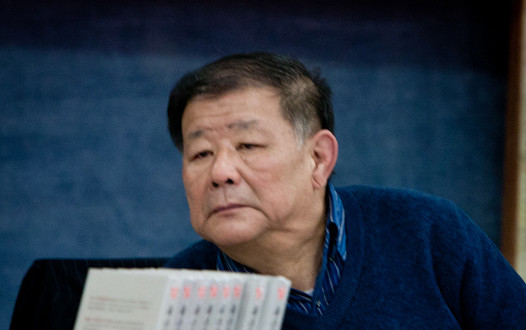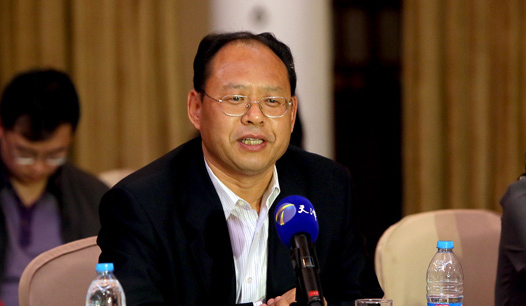New Culture icon Lu Xun left lasting legacy on world
Author : Gao Xinran, Li Yongjie Source : Chinese Social Sciences Today 2016-03-17


Zhang Mengyang (top) is a research fellow of the Institute of Literature at the Chinese Academy of Social Sciences and vice-chairman of the Association of the China Lu Xun Studies.
Liu Yunfeng (bottom) is a professor of the School of Literature at Nankai University and councilor of the Association of the China Lu Xun Studies.
2016 marks the 135th anniversary of the birth of Lu Xun (1881-1936), a famous litterateur and thinker in modern China and a major participant in the May Fourth Movement and the New Culture Movement. For more than a century, Lu’s people-oriented attitude and fighting spirit inspired Chinese people to break free from mental bondage and profoundly reflect on the soul of a nation. Lu’s legacy is a gift to the whole world. CSST reporters sat down with Liu Yunfeng and Zhang Mengyang to talk about the influence of Lu’s ideas on China and the world.
CSST: How is the valuable legacy Lu has left to us reflected in contemporary society?
Zhang: The value of Lu in China exists in a profound reflection on the spirit of the Chinese people and a firm resistance to the darkness. That explains why Lu is called a national soul. During the 20th century, when China transformed from an autocratic feudal country into a modern nation, Lu urged Chinese people to break out of the cage and free their mind in order to realize spiritual independence and freedom of thought. So Chinese people can accurately know themselves and the world, and ensure their appropriate position in the world and an appropriate strategy to stand firmly among the nations of the world. The ultimate goal Lu pursued throughout his life was to equip the Chinese people with literary awareness to enlighten them about themselves and the world. Lu devoted himself to transforming people from being base and ignorant to being conscious and wise, realizing his ideal of cultivating people, which had been his goal since a young age.
CSST: Although Lu once wrote, “lamenting people’s misfortune, raging about their servility,” he never lost hope that Chinese people could move toward real independence. That’s why Mao Zedong once said, “The road Lu Xun took stands for the orientation of New Culture in China.” So what do you think about this?
Liu: What I understand about the orientation of New Culture in China Mao referred to is that culture should serve the toiling masses, represent the fundamental interests of Chinese people and mirror the common people’s demands. Moreover, Mao emphasized that we should follow in Lu’s footsteps to carry forward China’s excellent culture and strengthen people’s confidence in their culture and nationality. Although Lu left behind few literary works, which had narrow themes, he consistently insisted on realism in his writing to demonstrate his sympathy toward poor farmers, women, children and intellectuals who were at the very bottom of society. His works are an accurate reflection of China’s semi-colonial and semi-feudal society and the suffering the toiling masses experienced. Lu’s hope was to attract more people’s attention in order to “heal” them and liberate their minds, completely overturning the autocratic, ignorant and feudal society in essence.
Although Lu indeed “lamented people’s misfortune” and “raged about their servility,” he never lost confidence in the Chinese people. He wrote in his article “Have Chinese people lost confidence?” that “since the ancient times, we never lacked hardworking people—people who risked their life in labor, people who pleaded for others and people who have sacrificed their own lives to seek the truth…Although there is the so-called official history, written to record the genealogy of emperors and nobles, it cannot obscure the brilliance of these common people, which is China’s backbone.” Lu always showed his concern for ordinary people, especially those in vulnerable groups. He assisted and cultivated a number of young writers and print artists, and also supported public welfare, which demonstrated his concern for them.
CSST: Today, there still exist many disputes about how to understand and evaluate Lu. Some people attack him, but others honor him. So what’s your view on this?
Liu: People expressed their understanding and evaluations of Lu when he was alive, and since he passed away, the disputes about him have never stopped. I think it is quite normal that there still exist many disputes about Lu since he is a globally influential figure. It is impossible for there to be only one voice about him. Despite attacks or abuse, he and his reputation cannot be damaged by negative factors. Lu is a major and objective force and plays a significant role in people’s hearts. Lu’s immortality in people’s hearts is totally the result of his diligent work and achievements instead of hype or official recognition. Compared to his contemporaries, he was not a productive writer, but his profound ideas, high-quality works and enthusiastic words were beyond anyone else. In The Collections of Lu Xun, it is rare to find a perfunctory, low-quality or plagiarized article. Lu’s works are his real painstaking efforts, so they distill his wisdom to its most crucial essence, which is most valuable. I believe the most valuable works cannot be diminished by any attacks or abuse.
Zhang: By comprehensively surveying the studies of Lu Xun in China, we find that there are three general misunderstandings about Lu. Some scholars deify him, regarding him as a perfect and indisputable idol. Others negate everything related to Lu and demonize him. There is also a group of scholars who tend to vulgarize Lu and his ideas. These three misunderstandings do not reflect what Lu really stood for. Lu’s works represent a profound culture with deep roots, and scholars should probe them, read them within the context of their historical background and help more readers to better understand their real value. Scholars must try to tell the truth about Lu’s life story through strict and comprehensive textual research and show a real Lu to people, which is an urgent task for researchers and scholars studying Lu Xun.
CSST: Does Lu only resonate within East Asian countries, which fall within the sphere of influence of Chinese civilization?
Liu: Lu belongs to both China and the world. During his lifetime, Lu produced a number of globally influential works, which have been translated into Japanese, Russian, Czech and other languages and received active responses in many countries. Since he passed away, his influence has been expanded. As far as I know, Lu’s works, in addition to the aforementioned languages, have also been translated into English, German, Italian, Bulgarian, Albanian, Vietnamese, Korean and so on. His works are loved by small and unrepresented nations or vulnerable groups. Lu stands for ordinary people’s interests, and that’s why he is able to resonate with them. Although we have different citizenries, races, beliefs and situations, we all share common values and standards. Therefore, Lu’s spirit is beyond national borders, and it’s a treasure that belongs to the whole world.
Zhang: Lu and his thoughts not only promoted Chinese people’s spiritual awakening but also drove the development of the spiritual culture of all mankind, which conforms to the demands of humanity. There is no doubt that Lu belongs to China and the world. Addressing the weakness of China in the 20th century, Lu believed that what we need most is not material but spiritual. Lu’s spiritual value is reflected in his opposition to materialistic trends as well as in his advocacy of spiritual development. Materialism and vulgarity as well as the lack of spiritual beliefs and constraints of rule of law to control people’s desires are not phenomena unique to China. Actually, it is a universal problem. Therefore, Lu’s encouragement of thought and rejection of materialism form the basis of the cultural and spiritual development of all mankind. The general development trend in future studies on Lu Xun will reexamine Lu, his ideas, his works and the times in which he lived from the perspective of a global view and world cultural resources.
Ye Shengtao made Chinese fairy tales from a wilderness
Ye Shengtao (1894–1988) created the first collection of fairy tales in the history of Chinese children’s literature...
-
How northern ethnicities integrated into Chinese nation
2023-09-18
-
Mogao caves
2023-09-12
-
Mogao Grottoes as ‘a place of pilgrimage’
2023-09-12
-
Time-honored architectural traditions in China
2023-08-29
-
Disentangling the civilizational evolution of China
2023-08-28
-
AI ethics in science fiction
2023-08-23














 2011-2013 by www.cssn.cn. All Rights Reserved
2011-2013 by www.cssn.cn. All Rights Reserved